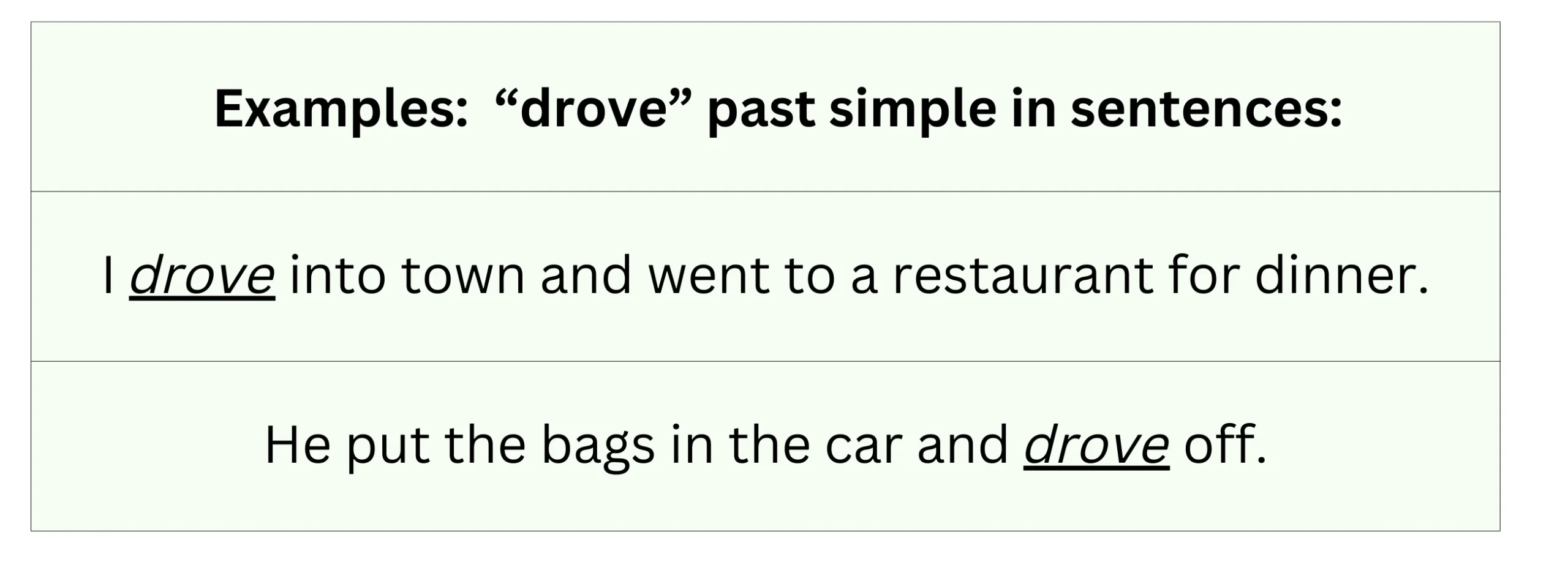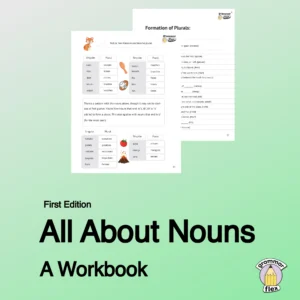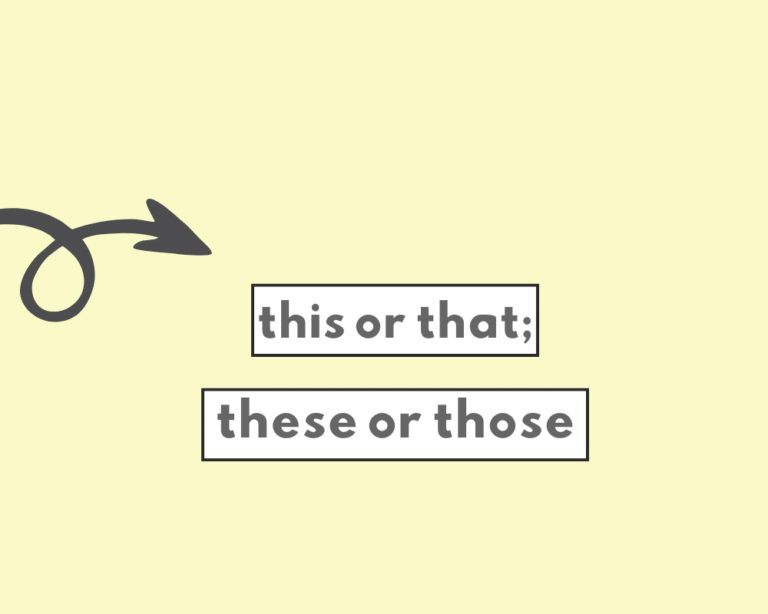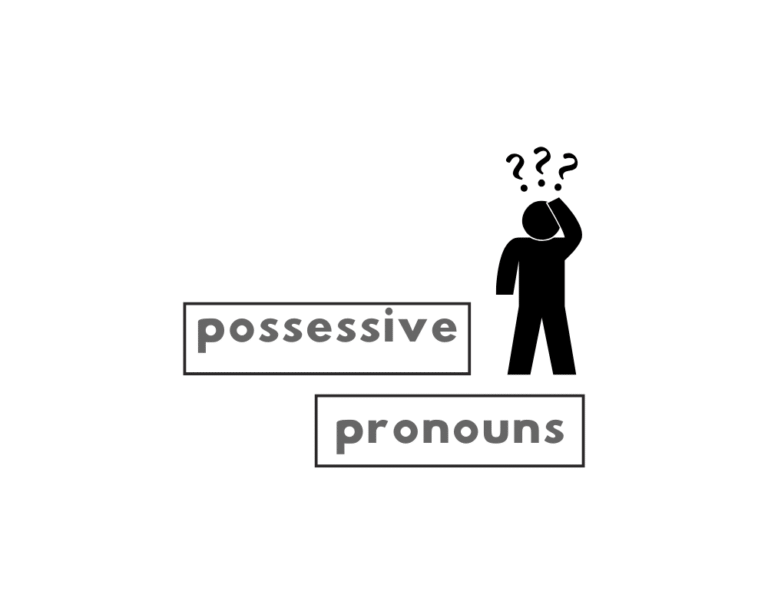
What’s the past tense of “drive”?
Both drove and driven are past verb forms of the present tense verb, drive. This makes drive another one of those irregular verbs with multiple past tense forms, like ate and eaten, or bit/bitten. When it comes to these irregular verb conjugations, there isn’t really a rhyme or reason, we just have to memorize them.
She drove to the grocery store yesterday.
They have driven across the country many times.
I driven to work this morning.
He had drove that car before.

Verb forms of ‘drive’
The verb drive refers to when someone “operates a car or other vehicle and controls its movement and direction.” The simple past tense form of drive, drove, shares the same spelling and pronunciation as the collective noun drove (“a herd of livestock”), but this is not the same sense in which we’re using the verb drove in this article.
| present | past | future | |
|---|---|---|---|
| simple | I drive | I drove | I will drive |
| continuous | I am driving | I was driving | I will be driving |
| perfect | I have driven | I had driven | I will have driven |
| perfect continuous | I have been driving | I had been driving | I will have been driving |
When to use drove vs. driven
| Form | Example | Usage |
|---|---|---|
| drove | My mother drove us to the airport. | Simple past |
| driven | Some of the people had driven a long way to attend the event. | Past participle (with auxiliary) |
The past perfect aspect describes when one past action was completed before another past action, and clarifies the order that they took place. We form the past perfect tense by using the past participle form of the verb + auxiliary verb had. The past simple doesn’t use auxiliaries or helper verbs, and is ‘simpler’ to use in this way.
Is “drive” a regular or irregular verb?
Drive is an irregular verb because its past forms do not use -ed. See the chart of other irregular verbs in the same class:
| base verb | past tense | past participle |
|---|---|---|
| drive | drove | driven |
| fly | flew | flown |
| blow | blew | blown |
| draw | drew | drawn |
| eat | ate | eaten |
| drink | drank | drunk |
“Drive” in the present tense (in sentences)
| Example Sentence |
|---|
| Don’t drive so fast! |
| Shall we drive or go by train? |
| It’s a two-hour drive to the beach. |
| What car do you drive? |
| You need a special licence to drive a heavy goods vehicle. |
Create flashcards with the present tense (“drive”), simple past tense (“drove”), and past participle (“driven”). Use example sentences for each form to aid memorization.
“Drove” in the past tense, in sentences
| Example Sentence |
|---|
| My mother drove us to the airport. |
| A car drove up to us and a man got out. |
| I drove to work this morning. |
| The urge to survive is what drove them on. |
| A stream of black cars drove by. |
Examples of the past participle “driven”, in sentences
| Example Sentence |
|---|
| Some of the people had driven a long way to attend. |
| The enemy was driven back. |
| The dairy products market will also be driven by consumer demand. |
| The work is driven by the need for information sharing. |
| They were driven to an unknown place in the hills. |
Synonyms of drive (in phrases)
| Phrase with “drive” | Synonym |
|---|---|
| drive a car | operate, pilot, steer |
| drive the team | lead, direct, guide |
| drive change | initiate, propel, motivate |
| drive forward | advance, push, move ahead |
| drive home a point | emphasize, stress, highlight |
| drive traffic | attract, bring, generate |
| drive innovation | foster, encourage, promote |
Origin of the verb “drive”
From etymology online on drive (v.):
Old English drifan “to compel or urge to move, impel in some direction or manner; to hunt (deer), pursue; to rush against” from Proto-Germanic *dreibanan.
Learn more about verbs
| Types of verbs & verb tenses | What’s the past tense of …? |
|---|---|
| forms of ‘to be’ | … seek? |
| auxiliary verbs | … teach? |
| present tense | … catch? |
| future tense | … buy? |
| past tense | … read? |
| perfect tense | … ring? |
| transitive vs. intransitive | … draw? |
| participles | … throw? |
| irregular verbs | … lead? |
| modals | … win? |
Worksheet: Irregular verbs
What is the simple past tense of “drive”?
What is the past participle of “drive”?
Complete the sentence: “She has _____ to work every day this week.”
Which sentence is correct?
Which form completes the question: “Have you ever _____ a race car?”
FAQs
What are the past forms of ‘drive’?
+
When is “drove” used?
+
When is “driven” used?
+
Can I use “driven” alone?
+
Is “drive” a regular verb?
+
Yash, D. "What’s the Past Tense of Drive? Drove or Driven?." Grammarflex, Jul 15, 2025, https://www.grammarflex.com/whats-the-past-tense-of-drive-drive-drove-or-driven/.
Sources
- Merriam-Webster, Definition of drive.











